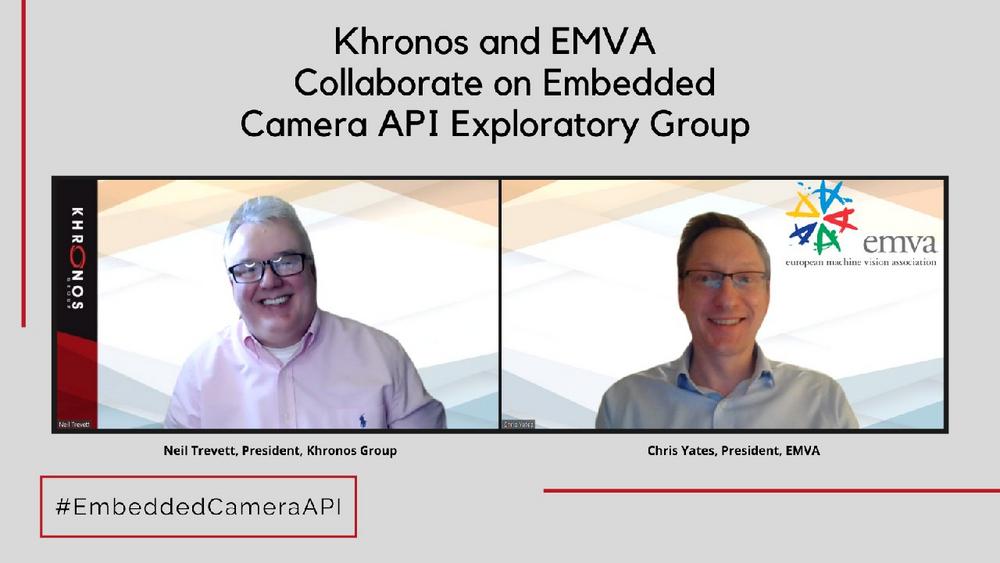All sensor and camera manufacturers, silicon vendors, and software developers working on vision and sensor processing are invited to participate in this initiative. More details and instructions for joining the group are here.
The Embedded Camera API Exploratory Group has been created in response to industry requests. Increasingly, camera sensors are being tightly integrated with image, vision and inferencing accelerators in self-contained systems. Innovation and efficiency in the embedded vision market is becoming constrained by the lack of open cross-vendor camera control API standards to reduce development and integration costs of multiple advanced sensors and cameras. A consistent set of interoperability standards and guidelines for embedded cameras and sensors could streamline deployment by manufacturers and system integrators by enabling control of a wide range of camera sensors, depth sensors, camera arrays and ISP hardware to generate sophisticated image streams for downstream processing by diverse accelerators.
This Exploratory Group will use Khronos’ proven framework for new initiatives in collaboration with the EMVA. Any companies, universities, consortiums, open-source participants, and industry experts who are willing to sign an NDA are welcome to join, at no cost. All participants will have an equal voice in exploring industry needs for and benefits of creating a consensus to create a Scope of Work (SOW) document describing the objectives and high-level direction of standardization initiatives of value to the industry. The Exploratory Group is expected to meet online over a period of several months starting on March 25, 2021.
Many industry leaders have indicated an interest in joining the Exploratory Group, including ALL3D, Almalence, AMD, Apertus, AREA, Arm, Cadence, Codeplay, Collabora, EA, Facebook, Google, Holochip, HP, Huawei, LunarG, Mobica, NVIDIA, Oculus, OPPO, Qualcomm, RedHat, Texas Instruments, Ultraleap, and Valve from Khronos; as well as EMVA members and machine vision players such as Allied Vision, Basler AG, Baumer, MVTec, and Stemmer Imaging AG.
”We are delighted to work with Khronos on this initiative to commonly understand the industry needs for the future of embedded vision”, said Dr. Chris Yates, EMVA President. “Both the EMVA and the Khronos group have a well-established history of standardization developments which enable industry to develop new products more simply, whilst ensuring friction is reduced in the market. This Exploratory Group is an excellent approach to understanding broader industry needs and will bring together many companies and views in an open forum. We look forward to working closely with the Khronos Group and welcoming all new and existing participants to this important initiative for the vision community.”
“Judging by the significant industry interest, the time seems right to organize an effort around identifying and aligning on the need for interoperability APIs for embedded cameras and sensors. This is a topic that is very relevant to Khronos as our acceleration APIs, such as OpenCL™, SYCL™, and OpenVX™ are often used to accelerate sophisticated sensor stream processing,” said Neil Trevett, Khronos Group president. “Our work is also very complementary to EMVA, and we are delighted that the two organizations are working together to bring a meaningful quorum from diverse parts of the industry into this cooperative exploratory process.”
All Exploratory Group discussions will be covered by a simple project NDA to encourage open discussions. The Group is open to all proposals and relevant topics but will not discuss detailed technical design contributions to protect participants’ intellectual property (IP). If a SOW is agreed, EMVA and Khronos will work to initiate the standardization work at the most suitable host organizations or open source projects, using those organizations’ normal collaborative agreements and IP frameworks.
About Khronos
The Khronos Group is an open, non-profit, member-driven consortium of over 150 industry-leading companies creating advanced, royalty-free, interoperability standards for 3D graphics, augmented and virtual reality, parallel programming, vision acceleration and machine learning. Khronos activities include 3D Commerce™, ANARI™, glTF™, NNEF™, OpenCL™, OpenGL®, OpenGL® ES, OpenVG™, OpenVX™, OpenXR™, SPIR-V™, SYCL™, Vulkan®, and WebGL™. Khronos members drive the development and evolution of Khronos specifications and are able to accelerate the delivery of cutting-edge platforms and applications through early access to specification drafts and conformance tests.
The European Machine Vision Association is a non-for-profit and non-commercial association representing the Machine Vision industry in Europe. The association was founded in 2003 to promote the development and use of vision technology in all sectors, and represents members from within Europe, North America, and Asia. The EMVA is open for all types of organizations having a stake in machine vision, computer vision, embedded vision or imaging technologies: manufacturers, system and machine builders, integrators, distributors, consultancies, research organizations and academia. All members – as the 100% owners of the association – benefit from the networking, cooperation, standardization, and the numerous and diverse activities of the EMVA. The EMVA is the host of four global machine vision standards: The two widely established standards GenICam and EMVA 1288 as well as the two standardization initiatives Open Optics Camera Interface (OOCI) and Embedded Vision Interface Standard (emVision).
www.emva.org
European Machine Vision Association
Ronda Santa Eulalia 37, nave 13
E08780 Palleja – Barcelona
Telefon: +34 (93) 1807060
Telefax: +34 (93) 1807060
http://www.emva.org
Marketing
Telefon: +34 (93) 1807060
Fax: +34 (93) 1807060
E-Mail: press@emva.org
![]()

